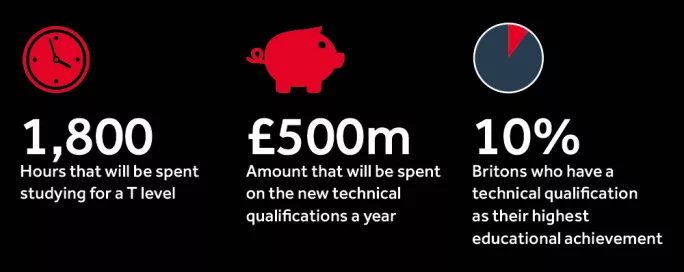Universities divided on accepting new T levels

They are the technical qualifications that will produce a generation of skilled workers, transforming Britain’s economic prospects in the process, in what the government claims is a world-class alternative to traditional academic qualifications. The new T levels currently being developed will, or so the theory goes, have the same status as A levels.
But the reality is different. While the Department for Education insists that the new technical qualifications will be “on a par” with their academic equivalents, some of Britain’s best universities have already rejected them out of hand.
This means that students with T levels will still need the traditional, more academic qualification to be considered for a place on a degree course at such institutions. It is a stark contrast to claims by the DfE that T levels should enable students to progress to higher-level technical education, including degree courses.
A spokesperson for Imperial College London, ranked as the eighth best university in the world by Times Higher Education, says: “We need to ensure that students are academically able to cope with the rigours of an Imperial degree and we do not believe that T levels provide a suitable preparation for students.”
That perspective is shared by University College London. A spokesperson says: “At present, UCL does not accept the new T-level qualification for entry to its undergraduate programmes. In general, we do not consider technical qualifications as sufficient preparation for academic study at UCL.”
Lack of detail
However, opinion is divided among the top institutions, with several other Russell Group universities open to the idea of accepting the new technical qualifications.
The universities of Glasgow, Leeds, and Sheffield have indicated they would accept T levels in principle, on a case by case basis (see box, above right).
Robin Gordon, head of admissions at the University of Glasgow, says: “In principle, the University of Glasgow is open to looking at all qualifications as a basis of entry to the university and T levels will be no exception.”
But a lack of detail over the curriculum and grading structures means they are “not yet in a position to formally state which of the T-level subjects we will accept, which we will not accept and what grades we will require”.
He adds that some BTEC qualifications are accepted “depending on their academic versus vocational content” while others require A levels alongside them. Mr Gordon comments: “We anticipate a similar stance to be taken on T levels as BTECs.”
More than half of the Russell Group universities are undecided over the new qualifications, blaming the lack of detail on the T levels.
The universities of Birmingham, Bristol, Cambridge, Cardiff, Edinburgh, Liverpool, LSE, Manchester, Newcastle, Oxford, Queens University Belfast, Southampton, Warwick and York have yet to decide what their position will be.
A spokesperson for the University of Oxford - which is ranked as the best university in the world by THE - says: “We are watching with interest the development and take up of the T levels and will base our judgement on them once we have more evidence on how the qualifications are used in schools.”

Although T levels are primarily a means of entry into skilled employment, they should also be able to lead into higher education, such as technical degree courses, according to the DfE.
Catherine Sezen, senior policy manager at the Association of Colleges, says that the new technical qualifications “should have Ucas points to support entry into higher education”. But Helen Thorne, director of external relations at university admissions body Ucas, says: “It’s too early to say how T levels will be considered when it comes to university admissions”.
She adds that the DfE is working with the higher education sector “and as more information becomes available about the structure, content and assessment of T levels, admissions practitioners will be able to form a view about their suitability for progression”.
The creation of T levels, announced last year, is part of a package of reforms on technical education recommended by the independent panel on technical education, chaired by Lord Sainsbury, in 2016.
Eleven T levels are being created. The first three - digital; construction; and education and childcare - are expected to start in 2020.
T levels in legal, finance and accounting; engineering and manufacturing; and health and science are due to begin in 2021, followed by ones in hair and beauty; agriculture, environment and animal care; business and administrative; catering and hospitality; and creative and design in 2022.

Further details about the new T levels are expected soon, in the wake of a consultation on the development and design of the new qualifications, which ended yesterday.
This included proposals for T levels to have “component grades, rather than a single overall grade” and for the new qualifications to be a combination of “core” content such as relevant maths, English and digital skills - and at least one specialist area.
Professor Steve West, vice-chancellor of the University of the West of England, who was a member of the Sainsbury review into technical education, says: “T levels in my mind must be seen as equivalent [to A levels] and recognised as such by all universities and employers.”
He adds: “If they can prepare students to be curious, creative, engaged with learning new ideas and applying that knowledge to practical situations they will have a fantastic platform to spring from whether that is following apprenticeship or more traditional degree routes.”
The new technical qualifications “will be just as high-quality and rigorous as A levels,” and will also “support entry in to higher education”, according to a DfE spokesperson.
You need a Tes subscription to read this article
Subscribe now to read this article and get other subscriber-only content:
- Unlimited access to all Tes magazine content
- Exclusive subscriber-only stories
- Award-winning email newsletters
Already a subscriber? Log in
You need a subscription to read this article
Subscribe now to read this article and get other subscriber-only content, including:
- Unlimited access to all Tes magazine content
- Exclusive subscriber-only stories
- Award-winning email newsletters